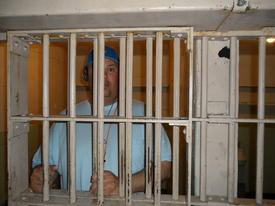Has anyone read this? So disheartening...

small_ninja
Posts: 365 Member
http://www.cracked.com/quick-fixes/fat-officially-incurable-according-to-science/
So Cracked posted this on its Facebook page today... I read some of the backup articles linked in it as well. It's so disheartening to think that all this hard work might come to nothing in the long run... I'm trying to accept the fact that, if I want a certain body type, I'm going to have to be constantly working for it, but this can be a little bit difficult to wrap my head around sometimes... What does everyone else think?
So Cracked posted this on its Facebook page today... I read some of the backup articles linked in it as well. It's so disheartening to think that all this hard work might come to nothing in the long run... I'm trying to accept the fact that, if I want a certain body type, I'm going to have to be constantly working for it, but this can be a little bit difficult to wrap my head around sometimes... What does everyone else think?
0
Replies
-
What a load of absolute balls.
Seriously, some people may gain a few pounds back, but I seriously doubt EVERY fat person who loses weight ever will get fat again. Thats like saying all drug addicts will eventually end up back on drugs. What a load of nonsense.0 -
I looked at it and call BS.
The entire article just talks about Weight Watchers. It doesn't make any reference to whether the people made any changes to their lifestyle other than doing Weight Watchers. Did any of them do exercise? What did they eat after they stopped doing Weight Watchers? Did they go back to eating 5000 calories a day?0 -
You can keep it off! I have for about 25 years. BUT.......you never can give up working on it. Yes the minute I relax my eating habits or exercise, it starts creeping back on.0
-
The report talks about fat cells, and if you have a defective gene you have more fat cells, and if you have two copies of the defective gene (one from mum one from dad) you have even more fat cell. And that the cells do not disappear, even if you lose weight, the cells are there, waiting to be filled with stored fat. That is not the same as saying you’ll be fat forever, though it is easier for someone with two defective genes to fill them. It does not mean you have to or will.
Imagine if the greatest sprinter in the world, gifted by his genes to be born with legs that could out sprint a leopard, just sat in front of the Television, would he be faster than the person who trained every day, but was born with average legs. No, just because your genes make it easy to be fat doesn’t mean it has to be that way.
Eat less, move more, and you’ll get slim, keep on going like that, and you’ll be slim forever.0 -
Yeah, I think that maybe the article is a little bit overdramatic. But one of the studies mentioned did talk about how those that lose a lot of weight find it difficult to maintain (more so than those that naturally maintain at the same weight) and it sounded kind of plausible. I guess the take away message is that you really do need to make this a 'lifestyle change' if you want it to work in the long run, and keep upping your workout intensity and watching your food intake.0
-
Two things - most of this seems to come from the point of view that you eat a special way to lose weight but then once you have lost weight you can eat any old how and that it's somehow unfair if that makes you put on weight again. Even if that's how you got fat in the first place. Pizza will always have mega calories and when you are thinner and need less to sustain your body that slice will be a greater proportion of your calorie need.
The other thing especially in the NY times article - are we sure that the diet they were recommending to people once they have lost weight is suitable for keeping the weight off. There is plenty of research out there to suggest increasing protein and minimising carbs is more liley to be successful. Particularly with the hormone responses that trigger hunger and satiety.
I wouldn't be disheartened, there are hundreds of contradictory studies and thousands of column inches to fill. worry about losing the weight before worrying about keeping it off! 0
0 -
yeah, load of spurious twaddle with no science behind it. The only thing remotely close is that I have read a few times that once you have been obese for some time and lose the weight, your body does try and get back to that overweight size and it can take a couple of years for that to disipate - but as long as you are aware of that then what's the problem? I am trying to undo decades of poor treatment of my body so don't care if it means that after I have lost my actual excess weight I will have to be vigilant - it's better than the alternative.
you just have to look at this site to see how many people are maintaining or pursuing fitness boundaries rather than weightloss to see how that's just not the case. this site isn't just for weight loss.0 -
Hey people are not born "out of shape" It's a matter of own self-power But I used to be friends with extremely thin skinny fat model who did participate in advertisment of tablets etc like befor eand after....she had always been boardering anarexia they made her look healthier via photoshop and via photoshop as well made a huge picture of her But I don't think people posting before and after picture here lie. I tend to trust this forum exactly because there are not so many "ideal models" posing with beautiful background etc...so it's real Internet has lots of good and bad info, you can chose if you believe in good or bad0
-
A load of bull****. The problem is that SO many people think that they can do a diet, get thin and then go back to how the ate before. And at WW and all of those ridiculous crash diet companies they never really teach you this - it's their way for the rest of your life and of course no one can do it and the weight comes back on.
If you are fat then you need to learn a new way of eating. That's it - there is no other way.0 -
Definitely its all about being prepared. If you want to go out to eat or splurge you have to eat less the next day or day before or work out more. You can maybe slip up a little bit. But 1 month of slip ups and you're screwed. It sucks cause all it takes is stress or something to throw you off track, and the weight is back on. This is my second time trying to lose- but im determined to keep it off this time and I made a good choice coming to this site for encouragement and to keep track of everything.Yeah, I think that maybe the article is a little bit overdramatic. But one of the studies mentioned did talk about how those that lose a lot of weight find it difficult to maintain (more so than those that naturally maintain at the same weight) and it sounded kind of plausible. I guess the take away message is that you really do need to make this a 'lifestyle change' if you want it to work in the long run, and keep upping your workout intensity and watching your food intake.0 -
I am not discouraged by it! What-did I think I was going to work my *kitten* off, then go back to a sedentary lifestyle? Nope! That I could suddenly start eating crap and not suffer the consequences? Surely not! This is my new life...and it feels awesome to chuck those fat clothes to the curb!!! Never give up!0
-
Yeah I hear this crap a lot.
Honestly, you may never be thin.
Does that mean you are doomed to be fat forever? no. You can definitely transform your body though.
If you make the same consistent effort to maintain your weight as you did to lose weight, then you shouldn't gain weight. But if you go from a diet like WW back to your normal eating, then yes you will gain weight. Some people think that once you lose weight you can give up on eating well and exercising which is BS.0 -
This is bonkers. I strongly believe that the majority of people who have dieted to lose way gain it back on because they have not altered there lifestyle. That is certainly the case with me. I have in the past lost a couple of stone (28lbs) through dieting alone and of course it comes back on when I return to eating 'normally' i.e. crap.
There have been a number of studies that show that the key to keeping weight off is not so much diet but exercise. Not just going to the gym more but simply moving more. Taking the stairs instead of the lift, walking to the shops instead of taking the car, standing up on the tube rather than sitting down.
The small changes that we can all take can make huge differences. I have this year again lost 2 stone to date and I have not followed any "diet" just being conscious of what I am eating and making some small changes to my lifestyle. I have not stopped having treats, fast food or cakes only moderating how often I indulge. I believe I have a much better outlook than I had 12 months ago so can only hope the weight stays off.0 -
This is the site that also has articles called "Four mythical creatures that actually exist" and "You might be a zombie". You do the math....0
-
This is the site that also has articles called "Four mythical creatures that actually exist" and "You might be a zombie". You do the math....
Actually, most of the Cracked stuff is backed up by some form of research - it links the studies it refers to throughout the articles. Despite the fact that most of the titles as sensationalist and it is a humour website.0 -
I am not discouraged by it! What-did I think I was going to work my *kitten* off, then go back to a sedentary lifestyle? Nope! That I could suddenly start eating crap and not suffer the consequences? Surely not! This is my new life...and it feels awesome to chuck those fat clothes to the curb!!! Never give up!
No, I wasn't planning on going back to eating like crap; not that I was eating particularly badly before anyways... Point is, knowing that I'm going to have to consistently watch what I eat for as long as I want to maintain a particular weight can be a little daunting, I think. That's not to say I'm not prepared to do it, I am; I mean, I'm still here, aren't I? I was just wondering if I wasn't the only one who felt like that...0 -
I can't read it as on phone but 1/3 people regain all they're list weight plus more it's been proven sadly0
-
Umm....there is pretty much no reason whatsoever to be disheartened by this article. This is on cracked.com. A satire/dumb humor/sarcasm web site. Although this article completely fails at the funny and just comes off as mean-spirited, and revolves around the fact that once you are fat, all you do is stuff your face, OBVIOUSLY, and there is never any chance of you ever getting your slobbering, gluttonous self to lose weight the proper, sustainable way. *rolls eyes*
Pretty much just a load of BS. Even reading the supplemental articles, ALL of the studies seem to be based on short-term, NON-sustainable crash type "diets" where people did not actually change their lifestyle, but just went back to their usual habits after the weight was lost. Not rocket science to know that the weight would come back on in those cases...0 -
I ADORE Cracked! However, while some people may gain some/all/extra weight back, I feel like there are wayyyy more people who genuinely are willing to put in the work to stay healthy. I've blown it before- I won't let it happen again.0
-
They are so right......let's all go get donuts!!!!!!0
-
yeah, load of spurious twaddle with no science behind it. The only thing remotely close is that I have read a few times that once you have been obese for some time and lose the weight, your body does try and get back to that overweight size and it can take a couple of years for that to disipate - but as long as you are aware of that then what's the problem? I am trying to undo decades of poor treatment of my body so don't care if it means that after I have lost my actual excess weight I will have to be vigilant - it's better than the alternative.
you just have to look at this site to see how many people are maintaining or pursuing fitness boundaries rather than weightloss to see how that's just not the case. this site isn't just for weight loss.
Spurious twaddle!!!! Omg that just made my morning, I'm going to make a concentrated effort to use that in a sentence at least twice today!
And as for the article: the hard truth is yes, we who have been chronically overweight or obese will have a tougher time maintaining a lower weight. BUT this is partly do to our eating habits, most of us really have no trouble losing weight, it's the consistency and maintenance that we have issues with. Most of us have no clue how to balance being healthy with enjoying food. It takes a long time to redevelop our habits to not go from one extreme to another with food. That's why I think slow and steady wins the race in weight loss, losing weight slowly teaches us how to eat and workout normally so that we can go to a party and endulge without completely being derailed. Health is a lifetime commitment, we can't just lose weight then go back to the old way, we can never go back to our old habits so we have to learn new ones.
All this article is to me is a reminder that I wasn't gifted with a lightening fast metabolism ergo I must always be conscious of my calorie intake. I plan to stay on mfp for at least a year after I get to my goal weight so that I can learn to healthily maintain that goal weight through all the holidays and parties and not revert to old habits.0 -
"And when I say "no one," I mean those cases are so obscenely rare that they don't even appear on the chart."
I aim this time to be one of those obscenely rare freaks. If it doesn't work out, I'm going to savor every second of being healthy and thin that I can get. When I get there, that is. And I can always just shoot myself when the scale starts going up again. Take that, genetics!
I have another statistic. We are all going to die and become wormfood. %100 of us, no exceptions. Best enjoy the time leading up to it and not worry too much about how eventually, no matter how healthy we eat or how thin and fit we are, we will all end by pushing up daisies.0 -
This is the site that also has articles called "Four mythical creatures that actually exist" and "You might be a zombie". You do the math....
Actually, most of the Cracked stuff is backed up by some form of research - it links the studies it refers to throughout the articles. Despite the fact that most of the titles as sensationalist and it is a humour website.
The article quotes statistics as its proof of research which can be used to prove both the affirmative and the negative dependent on the way that you analyse and present your results.
My opinion is that they have manipulated the statistics and failed to take into account crucial external factors.
Yes a person that loses a lot of weight has to change their habits permanently to maintain the weight loss and this is where most people fall down. If your life, family and friends enabled you to eat more calories than you use each day it's very difficult to maintain that weight loss after your official diet period is over. Hence the inability for most people to maintain the reduced weight.
You say this is a humour website. I am choosing to treat this article as such.0 -
With those who think the article is bull...
From the "much larger analysis of every [also hooy] long term study they could find" : "The percentage of individuals at 4 or 5 y of follow-up for VLEDs and HBDs were 55.4% and 79.7%, respectively." So the follow-up wasn't even complete. Yet Dude at Cracked says emphatically everyone regains the wieght. NOT.0 -
What a load of nitrate-laden carcinogenic bologna. The global "diet" industry counts on us being continually confused and discouraged so that we fall off the wagon and their "expert" services are needed again. It's the proverbial fox running the hen house!
The National Weight Control Registry tracks over 10,000 people who have lost weight and kept it off (I registered with it and am waiting to hear back from them - they check out every participant thoroughly). Check it out at http://www.nwcr.ws/ and read about it with this better article "The Fat Trap" at http://www.nytimes.com/2012/01/01/magazine/tara-parker-pope-fat-trap.html.
It's not easy but, then again, it is true.
Intention is the name of the game. If you honestly intend to lose weight and keep it off, you will.
-Debra0 -
Statistics mean nothing to the individual.0
-
The report talks about fat cells, and if you have a defective gene you have more fat cells, and if you have two copies of the defective gene (one from mum one from dad) you have even more fat cell. And that the cells do not disappear, even if you lose weight, the cells are there, waiting to be filled with stored fat. That is not the same as saying you’ll be fat forever, though it is easier for someone with two defective genes to fill them. It does not mean you have to or will.
Imagine if the greatest sprinter in the world, gifted by his genes to be born with legs that could out sprint a leopard, just sat in front of the Television, would he be faster than the person who trained every day, but was born with average legs. No, just because your genes make it easy to be fat doesn’t mean it has to be that way.
Eat less, move more, and you’ll get slim, keep on going like that, and you’ll be slim forever.
^^ THIS0 -
There is a lot of evidence that success is rare, the the goal is to make sure you are one of the successes.
The National Weight Control Registry tracks losers and finds that the ones that keep it off:
1. stay active
2. continue their eating habits (but since super low carb diets are hard to maintain over the long haul, they tend to fare horribly for long term success)
3. track/measure portions and keep a food diary
http://www.nwcr.ws/
The basic message: be consistent, whatever you did to lose the weight you need to keep up forever. So pick stuff you enjoy. food wise and exercise wise. (And adding muscle to burn more calories at rest doesn't hurt)0 -
yeah, load of spurious twaddle with no science behind it. The only thing remotely close is that I have read a few times that once you have been obese for some time and lose the weight, your body does try and get back to that overweight size and it can take a couple of years for that to disipate - but as long as you are aware of that then what's the problem? I am trying to undo decades of poor treatment of my body so don't care if it means that after I have lost my actual excess weight I will have to be vigilant - it's better than the alternative.
you just have to look at this site to see how many people are maintaining or pursuing fitness boundaries rather than weightloss to see how that's just not the case. this site isn't just for weight loss.
I also agree with this one. I've been overweight for more than a decade & eventually became officially obese just 3 years ago but right now I'm in one year of maintaining. Yes it took me 3 years to lose these kilos & I do had plateaus but that didn't stop me. I'm doing this more for my health than just aesthetics as I have hypertension, PCOS & diabetes. Bottomline here is that losing weight is just half the battle won & maintaining it still requires hard work & discipline (the two most hated words). The only problem with us is that we don't take these things seriously. We want to lose weight for all the wrong reasons.0 -
I think the article maybe overstates its case, but there's a good point there. We know already that people who manage to lose weight and keep it off long-term are the exception. We probably don't know exactly why yet, although it might be a mixture of reasons. But it's worth knowing, if only so that we can plan and prepare for it when trying to lose weight.
I've seen it happen to people around me. They lose significant amounts of weight, but over time, the weight goes back on. Not right away (so it's not because they've immediately gone back to old eating habits), but maybe a couple of years later. Before I started dieting this time I remember watching a few videos on youtube by a woman who had lost a lot of weight and managed to keep it off. She ate tiny, tiny portions, much less than I am eating now while losing weight. She wasn't able to eat like a normal person - ever. I'm aware that I might have to eat something like her for the rest of my life, and it does worry me.0
This discussion has been closed.
Categories
- All Categories
- 1.4M Health, Wellness and Goals
- 398.2K Introduce Yourself
- 44.7K Getting Started
- 261K Health and Weight Loss
- 176.4K Food and Nutrition
- 47.7K Recipes
- 233K Fitness and Exercise
- 462 Sleep, Mindfulness and Overall Wellness
- 6.5K Goal: Maintaining Weight
- 8.7K Goal: Gaining Weight and Body Building
- 153.5K Motivation and Support
- 8.4K Challenges
- 1.4K Debate Club
- 96.5K Chit-Chat
- 2.6K Fun and Games
- 4.8K MyFitnessPal Information
- 12 News and Announcements
- 21 MyFitnessPal Academy
- 1.5K Feature Suggestions and Ideas
- 3.2K MyFitnessPal Tech Support Questions



















